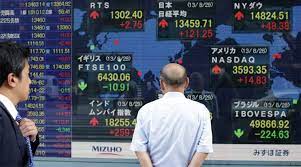
- December 10, 2024
- By: Admin1_blog
- Asia Market, Indices
Dylan Butts
China stocks rose Tuesday amid broader gains in Asia-Pacific markets, following losses on Wall Street that saw the S&P 500 and Nasdaq Composite pull back from record highs ahead of key inflation data.
Sentiment was boosted by Beijing’s announcement of “more proactive” fiscal measures and “moderately” looser monetary policy next year as part of efforts to boost domestic consumption.
Mainland China’s CSI 300 index jumped 1.9% in trading, while Hong Kong’s Hang Seng index was up 0.9%.
News of the measures, which came from an official readout late Monday after mainland China market had closed, had sent the Hang Seng index nearly 3% higher that evening.
China’s 10-year bond yield hit a record low Tuesday, and was last at 1.893%.
South Korea’s benchmark Kospi gained over 2.2% and led gains in the region, while the small-cap Kosdaq surged up 5.3% as investors continued to monitor the country’s political situation.
South Korean news agency Yonhap reported that the leader of the main opposition party, Lee Jae Myung, said his party would pass a downsized budget bill for next year through a plenary session later in the day.
Australia’s S&P/ASX 200 closed 0.36% lower to finish at 8,393, after the Reserve Bank of Australia held its benchmark rate at 4.35% for the 10th consecutive time.
Japan’s Nikkei 225 climbed 0.52%, while the Topix gained 0.37%.
| TICKER | COMPANY | NAME | PRICE | CHANGE | %CHANGE |
|---|---|---|---|---|---|
| .N225 | Nikkei 225 Index | *NIKKEI | 39367.58 | 207.08 | 0.53 |
| .HSI | Hang Seng Index | *HSI | 20427.94 | 13.85 | 0.07 |
| .AXJO | S&P/ASX 200 | *ASX 200 | 8393 | -30 | -0.36 |
| .SSEC | Shanghai | *SHANGHAI | 3422.56 | 20.03 | 0.59 |
| .KS11 | KOSPI Index | *KOSPI | 2417.84 | 57.26 | 2.43 |
| .FTFCNBCA | CNBC 100 ASIA IDX | *CNBC 100 | 10235.47 | -16.85 | -0.16 |
In the U.S. on Monday, tech shares struggled and investors prepared for key inflation data that will be released this week.
The broad market S&P 500 fell 0.61% to close at 6,052.85, and the tech-heavy Nasdaq slid 0.62% to end at 19,736.69. The Dow Jones Industrial Average shed 240.59 points, or 0.54%, settling at 44,401.93.
AI bellwether Nvidia saw its shares dropped about 2.6% after a Chinese regulator announced that it was investigating the artificial intelligence chip behemoth for potentially violating the country’s antitrust law.
Advanced Micro Devices, another chipmaker, closed 5.6% lower, while tech giants Meta Platforms and Netflix also struggled.
Bitcoin prices also retreated after topping $100,000 for the first time ever last week, a sign that investors might be souring on risk assets.
— CNBC’s Sean Conlon and Sarah Min contributed to this report.
Shares of cosmetics company Mao Geping surge as much as 87% on Hong Kong debut
Shares of cosmetics company Mao Geping soared as much as 87.2% on Tuesday in their debut on the Hong Kong exchange.
This comes after the company’s upsized its IPO of $2.33 billion Hong Kong dollars ($300.6 million), in which it sold 78.4 million shares at 29.8 Hong Kong dollars apiece, the top end of the its price band.
Domestic interest in the stock was strong, with Mao Geping’s Hong Kong offering being almost 920 times subscribed. The international offering was oversubscribed by over 30 times.
— Lim Hui Jie
India’s Reliance Industries seeks up to $3 billion loan for debt refinancing, Bloomberg reports
India’s Reliance Industries, owned by billionaire Mukesh Ambani, is reportedly in talks with banks concerning a loan of as much as $3 billion to refinance debt that is due next year.
Citing sources familiar with the matter, Bloomberg reported Tuesday that about six banks are discussing the loan, which would be syndicated to the wider market in the first three month of next year.
The terms of the loan are yet to be finalized and are subject to change, the report added.
The Indian multinational conglomerate has around $2.9 billion of debt due in 2025, including interest payments, as per data compiled by Bloomberg News.
— Dylan Butts
India appoints Revenue Secretary Sanjay Malhotra as new central bank governor
India has appointed Revenue Secretary Sanjay Malhotra as governor of the country’s central bank for a three-year period, according to CNBC TV18.
He will on Tuesday take over from outgoing Governor Shaktikanta Das, who also served as secretary in the Ministry of Finance before his six-year stint with the Reserve Bank of India (RBI).
Das, who shepherded India’s demonetization initiative in 2016 prior to his time at the central bank, was seen as key to normalizing the RBI’s relationship with the government and steering India through the economic turbulence of the Covid-19 pandemic. His leadership was, nevertheless, also scrutinized during a high-inflation environment for holding back on moving rates.
— Ruxandra Iordache
CNBC Pro: Deutsche Bank names its UK “top pick” stocks with compounding growth potential — and one has more than 50% upside
Deutsche Bank has named seven London-listed companies in the business services sector as its top investment picks for 2025, highlighting shares with strong growth potential and defensive characteristics in an uncertain market environment.
One of the stocks has the potential to rise by more than 50% over the next 12 months, the bank said.
— Ganesh Rao
Unpredictable risks may leave markets vulnerable, says UBS
The market has managed to shake off the numerous unpredictable political and geopolitical events over the past few weeks.
“With relatively few identifiable risk events before President-elect Trump assumes office on 20 January, and unexpected events unknowable by definition, the rally could easily continue well into 1Q,” chief investment officer Americas Jason Draho wrote in a Monday note.
However, Draho added that while this is “great for holiday spirit,” it does leave the market more vulnerable to even small risks happening.
The investor cited two upcoming risk events: November’s consumer price index slated for release on Friday and the Federal Reserve’s policy meeting next week.
— Hakyung Kim
A TikTok ban could boost shares of Snap and Meta, Deutsche Bank says
Last week, a federal appeals court upheld a law that gives ByteDance until January to sell TikTok. While it remains to be seen if the app is indeed taken off app stores by Jan. 19, Deutsche Bank analyst Benjamin Black analyzed the potential ramifications such a move might have on TikTok’s competitors.
“We calculate that every 10% shift of total TikTok U.S. engagement to its competitors drives an incremental $5 in value/share for Snap (44% upside from Friday’s open), $10/share (2% upside) for Meta, with the impact to Alphabet insignificant given the lower relative margins for YouTube, and the fact that the lion’s share of GOOG’s value is tied back to Search,” the analyst wrote in a Monday note.
— Lisa Kailai Han
Gold prices reach fresh highs on renewed China buying, Fed rate cut enthusiasm
Gold prices hit two-week highs on Monday on renewed buying by China’s central bank. Anticipation of a U.S. Federal Reserve interest rate cut next week also added to bullishness around the commodity.
Spot gold gained 1.2% to $2,665.39 per ounce. U.S. gold futures added 1.1% to $2,688.40.
“The most important factor is news that People’s Bank of China reported that it again resumed its gold purchases … the market is getting hopeful that we could see other central banks follow suit and we could see a resumption of record territory buying,” Bart Melek, head of commodity strategy at TD Securities, told Reuters.
— Pia Singh, Reuters
Energy stocks outperform
Energy stocks bucked the S&P 500′s downturn on Monday.
The sector of stocks within the S&P 500 rose about 0.7%. By comparison, the broad index as a whole slid 0.4%.
APA led the energy sector higher with a gain of just more than 5%. Occidental Petroleum and Valero Energy were the next-biggest gainers, as each rose 2.7%.
Materials and health care were the only two other sectors within the S&P 500 tracking for gains on Monday. Communication services was the worst performer, on the other hand, with a loss of more than 1%.
— Alex Harring
Source : cnbc



